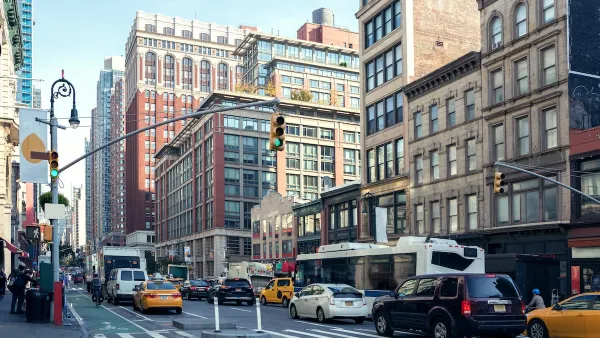Due to its successful application in cities such as London and Singapore, congestion charging has become the favored approach for changing driver behavior. However, a professor at Stanford University may have found a nicer way to change habits.
With efforts to impose congestion pricing in the United States having failed thus far, most prominently in New York City, Balaji Prabhakar, a professor of computer science at Stanford University may have found an incentive-based program to accomplish similar goals, reports John Markoff.
Choosing the carrot over the stick, Stanford deployed a new system designed by
Dr. Prabhakar's group this spring with the aim of reducing traffic congestion at peak hours. "Called Capri, for Congestion and Parking Relief Incentives,
it allows people driving to the notoriously traffic-clogged campus to
enter a daily lottery, with a chance to win up to an extra $50 in their
paycheck, just by shifting their commute to off-peak times."
"Dr. Prabhakar is a specialist in designing computer networks and has conducted a variety of experiments
in using incentives to get people to change their behavior in driving,
taking public transit, parking and even adopting a more active
lifestyle. Unlike congestion pricing,
which is mandatory for everyone and usually requires legislation,
"incentives can be started incrementally and are voluntary," he said."
"Moreover, systems based on incentives can offer a huge advantage in
simplicity. Until recently, the Stanford system required sensors around
campus to detect signals from radio-frequency identification tags that
participants carried in their cars. But the need for such an
infrastructure has vanished now that so many drivers carry smartphones
with GPS chips or other locaters."
While Markoff notes that Stanford plans to expand the popular program soon to cover parking on campus, experts disagree on whether an incentives-based system could work as well in a city such as New York or San Francisco.
FULL STORY: Incentives for Drivers Who Avoid Traffic Jams

Planetizen Federal Action Tracker
A weekly monitor of how Trump’s orders and actions are impacting planners and planning in America.

Restaurant Patios Were a Pandemic Win — Why Were They so Hard to Keep?
Social distancing requirements and changes in travel patterns prompted cities to pilot new uses for street and sidewalk space. Then it got complicated.

Map: Where Senate Republicans Want to Sell Your Public Lands
For public land advocates, the Senate Republicans’ proposal to sell millions of acres of public land in the West is “the biggest fight of their careers.”

Maui's Vacation Rental Debate Turns Ugly
Verbal attacks, misinformation campaigns and fistfights plague a high-stakes debate to convert thousands of vacation rentals into long-term housing.

San Francisco Suspends Traffic Calming Amidst Record Deaths
Citing “a challenging fiscal landscape,” the city will cease the program on the heels of 42 traffic deaths, including 24 pedestrians.

California Homeless Arrests, Citations Spike After Ruling
An investigation reveals that anti-homeless actions increased up to 500% after Grants Pass v. Johnson — even in cities claiming no policy change.
Urban Design for Planners 1: Software Tools
This six-course series explores essential urban design concepts using open source software and equips planners with the tools they need to participate fully in the urban design process.
Planning for Universal Design
Learn the tools for implementing Universal Design in planning regulations.
Heyer Gruel & Associates PA
JM Goldson LLC
Custer County Colorado
City of Camden Redevelopment Agency
City of Astoria
Transportation Research & Education Center (TREC) at Portland State University
Camden Redevelopment Agency
City of Claremont
Municipality of Princeton (NJ)





























